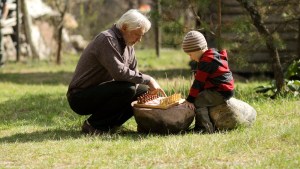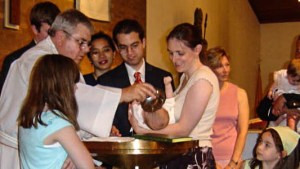In some sectors of the Catholic Church, especially in charismatic groups, the practice of offering prayers, saying the Rosary, or celebrating Masses for “intergenerational healing,” or the healing of one’s family tree, has become widespread. On the one hand, the practice attracts a lot of followers; on the other, it draws harsh criticism.
The International Association of Exorcists addressed this issue at its congress held in Rome in September 2018, under the direction of Fr. Rogelio Alcántara, a Mexican priest, who was asked to provide an exhaustive study on the matter.
Alcántara is a doctor of theology and director of the Commission for the Doctrine of the Faith of the Archdiocese of Mexico City. At the congress, Fr. Alcántra delivered a decidedly negative evaluation of intergenerational healing.
Some supposedly inherited evils
Fr. Alcántara summarizes the idea that inspires intergenerational healing: “The evils that people suffer today (psychic, moral, social, spiritual, and corporal) have a cause in their ancestors. The current person would be like the last link in a chain through which the evils that come to him are passing.”
Where would these evils come from? They are purportedly of a triple origin: the bad inclinations of one’s ancestors, their sins, and the curses invoked on their descendants. These lead a person’s descendants to have very strong “inclinations and tendencies to certain evils,” or worse to “ancestral bondage.”
The solution proposed to believers by some priests and groups dedicated to the ministry of healing and liberation would be to “heal their family tree with religious practices and specific prayers that can cut off that noxious ‘inheritance’ that has been received from the ancestors,” achieving self-liberation and the forgiveness of the ancestors.
To this end, rites are carried out that involve taking on “new concepts such as: transference, influence, intergenerational curse, ancestral inheritance, stickiness, healing of the family tree, etc.”
Where does this theory come from?
After offering significant quotations from several authors who support this idea, Fr. Alcántara declared that we cannot find any Catholic author who has taught the doctrine of “ancestral sin” before the second half of the 20th century. He concludes, therefore, that “it is a ‘novel doctrine,’ an invention, that represents a grave danger for those who want to accept divine revelation as presented to us by the Catholic Church.”
This theory, according to Fr. Alcántara, “appeared for the first time among Protestants through pagan inspiration. A Protestant missionary, Kenneth McAll, is the one who gave the impulse to the practice of ‘healing’ the family tree. Eventually, it became a movement.”
In addition, Fr. Alcántara argues, these ideas also have no philosophical or scientific basis. “The supposed philosophical foundation of the so-called ancestral damage is very similar to what is popularly known as ‘karma,’ an idea derived from the Hindu religion.”
Although the doctrine of ancestral sin also has no theological foundation, Fr. Alcántra notes that its defenders “try to justify their application of ‘karma’ to Christian theology based on the psychological sciences, especially the thought of Carl Jung.” They also try to root their ideas in the Catholic doctrine of original sin, but without properly justifying that application.

Read more:
Is there psychological evidence for Original Sin?
But … doesn’t ancestral sin appear in the Bible?
The idea that the sins of ancestors influence people’s lives appears in several passages of the Old Testament, which Fr. Alcántara details and analyzes to demonstrate that the correct interpretation of those texts requires reading them in their context, understanding them “in a pedagogical progress of revelation, which reaches its fullness in Christ, who teaches us the authentic concept, for example, of divine punishment and mercy.”
It is precisely the mercy of God that is emphasized in these biblical texts, the divine response to human sin. Accordingly, other texts in the Old Testament more clearly state “that each person will bear his own guilt and the consequences of his sin.” In these texts, “the personal dimension of sin is emphasized.”
So, Fr. Alcántara reminds his listeners, in the Old Testament “there is already a clear clarification of the relationship between the consequences of sin and personal guilt.” This is confirmed by the words of Jesus in the Gospels, such as when he answers those who asked him whether a blind man was afflicted because of his own sins or those of his parents.
Fr. Alcántara affirms that “from the analysis of the texts of sacred Scripture we can conclude that the ‘doctrine’ of so-called ‘ancestral sin’ and the so-called ‘prayer of healing of the genealogical tree’ has no foundation in divine Revelation.”
Distinction between influences, sins, and curses
Fr. Alcántara next clarified the terms “influence,” “sin,” and “curse” in order to distinguish them properly. In the first place, he defines intergenerational influence as “any element that alters or determines the way of thinking or acting of someone of a future generation.” The influence of one generation on another exists, and is something natural, caused by environmental factors or coexistence (such as human or religious education, good or bad example, etc.).

Read more:
I’ve been witnessing intergenerational joy, and it’s changing me
Secondly, he clarifies on the basis of Revelation that the so-called intergenerational or ancestral sin — understood as sin that is transmitted from one generation to another — does not exist, because sin is a free act, whose consequences for transgressing the divine law — guilt and punishment — are personal and therefore non-transferable.
Fr. Alcántara reiterates that “if by ancestral sin we mean the sin of ancestors that is transferred to the current generation, it does not exist, since the only sin that can be transmitted through generation is original sin.”
He adds that “if by ancestral sin we simply mean the sin committed by our ancestors and that is not transmitted to current generations, the expression could be accepted. However, because it lends itself to confusion and because it runs the risk of being interpreted in the first sense, it is better to avoid the term.”
The sins of an ancestor cannot predispose the descendant to sin. It can only be said that “they could naturally (environmentally) have an influence as the example given by people close to the sinner, but they cannot predispose anyone to sin.” Sins are repeated in families, above all, due to bad example.

Read more:
Passing down the family one-liners
Do curses have any effect?
At this point, Fr. Alcántara treats the question of “the curses that are made as a request to the devil” for a person to be deprived of some good. After analyzing different types of curses, Fr. Alcántara addresses their effectiveness: “Whoever curses can simply wish for the evil of the other, but pure human desire has no power to cause any harm. The curse could have an effect when the one who carries it out asks for evil for another,” in theory either by asking God or the devil.
Since God does not respond to a request that seeks the evil of another person, the only ones who could agree to fulfill a curse are the demons.
And how is that possible? Alcántara responds: “Through a mystery — often incomprehensible to us — God allows his enemy to act, causing physical, psychological or spiritual damage to God’s human creatures, for their conversion and salvation.”

Read more:
Exorcism 101: There are two main types of exorcism
Still, one may wonder: What is the reach of a curse or witchcraft over time? According to Fr. Alcántara, a man can curse his descendants, but only those that are living, because he cannot have authority over those who have not been conceived.
What dangers are there?
In conclusion, Fr. Alcántara observes that “offering Masses and saying prayers to heal one’s family tree is foreign to Catholic doctrine and liturgy … Neither in revelation, nor in the Church Fathers, nor in the history of Catholic theology does one find examples of this practice.”
Repeating the teaching of the French bishops, Fr. Alcántara warns that “the so-called prayer for healing of the family tree leads people to seek the reasons for their suffering outside themselves. This in turn prevents a true process of psychological help that could heal the individual. Therefore, the Masses that are celebrated for this intention are more of a psychological danger for the faithful than an aid.”

Read more:
The spiritual dangers behind Reiki healing services
Finally, Fr. Alcántara emphasizes that “these Masses divert the charity we should have towards our deceased loved ones. Indeed, instead of offering Masses for them, we are asking for Masses for ourselves, insofar as we want their sins to stop affecting us in this life.”

Read more:
The Jesuit trick to healing past hurts

